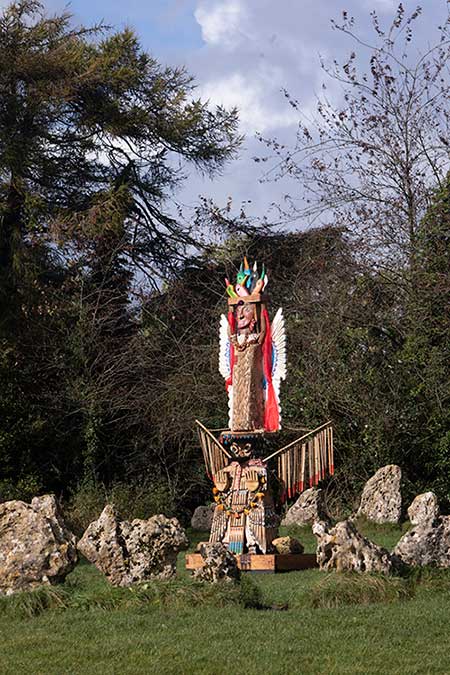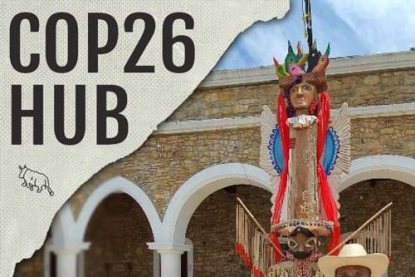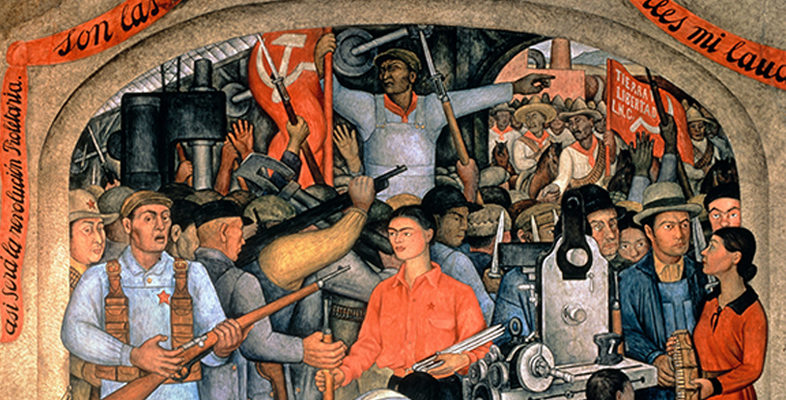“Progress” is a huge contributor to the crisis we face: it is the positive image that Western powers have invoked in order to justify colonialism, enslavement, unlimited resource extraction, absurd levels of consumption and genocides against both human and non-human beings.
Since 2019, I have curated Border Crossings’ ORIGINS Festival, a biennial gathering to share and show Indigenous arts and culture in London, powerfully supported by the OU in the person of Professor Graham Harvey. As the 2021 Festival approached, it became clear that our usual fortnight of performances, debates and exhibitions would not be possible: COVID-19 (itself a direct consequence of the destruction of natural habitats and industrial farming) was making it impossible for Indigenous artists to travel or audiences to gather.
 TOTEM LATAMAT, an Indigenous wooden sculpture from Mexico
That this should happen in the very year Britain would host the UN Climate Change conference, and in the aftermath of #BlackLivesMatter drawing attention to colonial histories, seemed particularly painful. Our response has been to initiate a series of projects to engage UK audiences with Indigenous worldviews, either through participation in Indigenous music projects, walks at sites of Indigenous significance, or encounters with Indigenous artworks. The most important of these is TOTEM LATAMAT, carved by Totonac artist Jun Tiburcio and brought by sea from Mexico. In this 4.5m tall sculpture, Jun shows birds emerging from trees and humans, humans emerging from birds and animals, earth and air embracing and connecting humanity. As the Totem made its journey to Glasgow for COP26, it encouraged people to think in a different way about their reciprocal relationship with other beings, to recognise ecological unity, and to change their way of being in the world.
TOTEM LATAMAT, an Indigenous wooden sculpture from Mexico
That this should happen in the very year Britain would host the UN Climate Change conference, and in the aftermath of #BlackLivesMatter drawing attention to colonial histories, seemed particularly painful. Our response has been to initiate a series of projects to engage UK audiences with Indigenous worldviews, either through participation in Indigenous music projects, walks at sites of Indigenous significance, or encounters with Indigenous artworks. The most important of these is TOTEM LATAMAT, carved by Totonac artist Jun Tiburcio and brought by sea from Mexico. In this 4.5m tall sculpture, Jun shows birds emerging from trees and humans, humans emerging from birds and animals, earth and air embracing and connecting humanity. As the Totem made its journey to Glasgow for COP26, it encouraged people to think in a different way about their reciprocal relationship with other beings, to recognise ecological unity, and to change their way of being in the world.
In his new book Einstein’s Fridge, the science writer and documentary maker Paul Sen argues that all we have to do to solve the climate crisis is listen to the scientists. Science, he claims, already holds all the solutions – it just requires political leadership to enact them. He repeats the frequently heard mantra about expanding the use of renewable sources and increasing investment in nuclear power, as well as geothermal and tidal energy. Technology, he claims, will get us out of this. However, in common with Patricia Fara’s review, I believe that scientific enquiry and its technological consequences are not necessarily “progressive” at all.
“Progress” is a huge contributor to the crisis we face: it is the positive image that Western powers have invoked in order to justify colonialism, enslavement, unlimited resource extraction, absurd levels of consumption and genocides against both human and non-human beings. Far from offering yet another opportunity for scientific and technological solutions to “progress” humanity beyond the crisis, climate change has exposed the fallacy that history is a linear process of positive development. As Amitav Ghosh argues: “This idea is so deeply entrenched in modern culture that it would have been impossible to dislodge if the ongoing disruptions in the planet’s climate had not shown that ever-increasing 'growth‘ will lead, not to a glittering city on a hill, but to the envenomed future that now looms ahead of us.”
At best, technology is morally neutral, although given the way much scientific research is funded I’m not sure we can even go that far. It is certainly not “good” in itself, and without a moral and cultural framework to support it, it can cause disaster. Even if Sen is right and there are technological solutions available, it will require a paradigm shift to persuade anyone to enact them. The big question that we face is not “What do we do about the climate crisis?” but “Why are we not doing anything to stop the climate crisis?” This is a question that brings the humanities into play – ethics, history, the arts, culture and spirituality have a role in this which is every bit as crucial as that played by science.
The way to deal with climate change is not through more technology but through a cultural shift that locates science and technology within a more global discourse, with a particular emphasis on the worldviews of Indigenous and other formerly or currently colonised peoples whose lives, lands and livelihoods are most at threat from the climate emergency. Colonisation was, after all, the confederate of capitalism in the rape of the environment.
In the worldview of the Native American botanist Robin Wall Kimmerer and many other Indigenous activists, artists and thinkers, there is no distinction between humanity and nature. We are part of the ecosystem. When that idea is expressed culturally, and so becomes absorbed into values that determine action, people stop treating the Earth and its other inhabitants (plants and animals, waters and minerals) as their property, as resources to be plundered. They see all of these beings as their relatives. Well, of course they are. Even science can tell you that.
 Michael Walling is the Artistic Director of Border Crossings and Visiting Professor at Rose Bruford College. Read more on the Origins Website.
Michael Walling is the Artistic Director of Border Crossings and Visiting Professor at Rose Bruford College. Read more on the Origins Website.




Rate and Review
Rate this article
Review this article
Log into OpenLearn to leave reviews and join in the conversation.
Article reviews